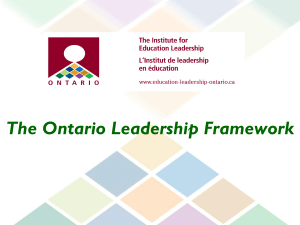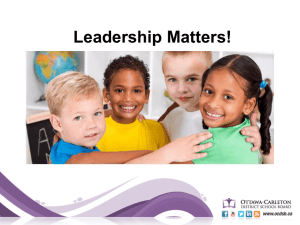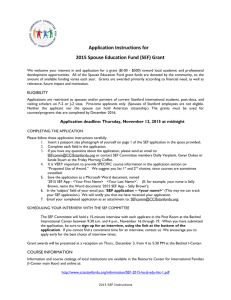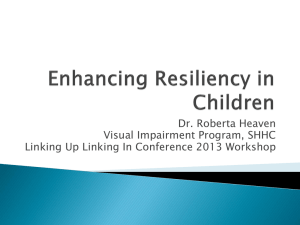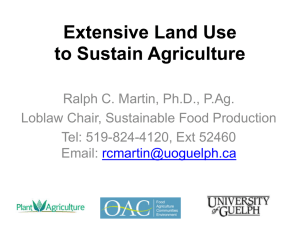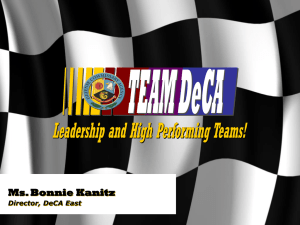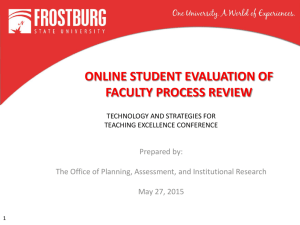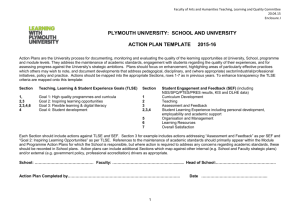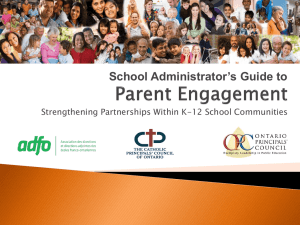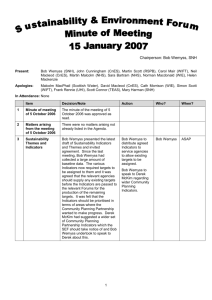School Effectiveness Framework, 2013 - SIM K-12
advertisement
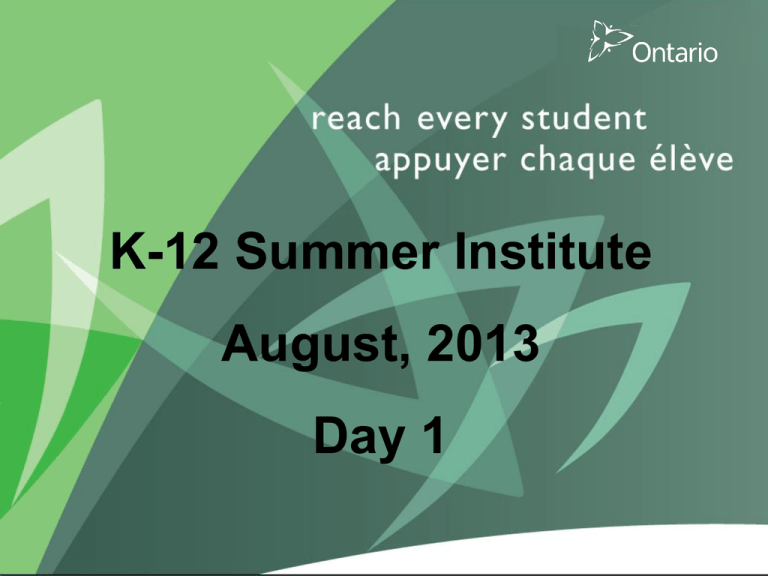
K-12 Summer Institute August, 2013 Day 1 1 K-12 Summer Institute, 2013 The powerpoint for today and tomorrow can be downloaded from sim.abel.yorku.ca To do: View the quotes Scan the article Know Thy Impact: Teaching, Learning and Leading. Day 1: Setting the Context The School Effectiveness Framework Personal Leadership Resources in the OLF Guest speaker – Paul Tough The Resilient Student/The Resilient Leader Placeholder for Mary Jean’s comments Session Outcomes Through working together to think about the deep implementation of the strategies in the BIPSA and SIP and to examine how the SEF and OLF support the work, school and system leaders will: deepen their knowledge and understanding of the revised School Effectiveness Framework and the Ontario Leadership Framework to support and inform their work understand how Personal Leadership Resources enhance and impact leadership, teaching and learning use the SEF and OLF to inform monitoring and feedback related to needs/goals identified in the BIPSA and SIP Understand how student’s personal traits and resources impact leadership, teaching and learning. Thinking Template Setting the Context School Effectiveness Framework, 2013 School Effectiveness Framework Guides thinking and practice in classrooms and schools Student engagement, learning and well-being Component name changes: Student Voice is now Student Engagement Programs and Pathways is now Pathways Planning and Programming School Effectiveness Framework, 2013 Stronger references to: Student well-being Culturally, relevant, responsive pedagogy Metacognition Self-regulation Achievement Charts Instruction and Assessment are a seamless process Students and teachers are partners in the teaching/learning process School Effectiveness Framework Select one component on which you would like to focus. What is new? What changes/refinements in practice does this revision imply? How might a common understanding of this component and/or indicator be created among your school/district team(s)? School Effectiveness Framework Move to a table labelled with the colour of your component: Assessment for, as and of Learning - School and Classroom Leadership - Student Engagement - Curriculum, Teaching and Learning - Pathways Planning and Programming - Home, School and Community Partnerships - red yellow green pink orange blue Building Team Knowledge What is new? What changes/refinements in practice does this revision imply? How might a common understanding of this component and/or indicator be created among your school/district team(s)? Personal Leadership Resources in the OLF 2012 Cognitive Resources Social Resources Psychological Resources Two Especially Useful Personal Leadership Resources Two New PLRs Proactivity (a psychological resource) Systems Thinking (a cognitive resource) Proactivity Being able to stimulate and effectively manage change on a large scale under complex circumstances Showing initiative and perseverance in bringing about meaningful change Proactivity Systems Thinking Being able to understand the dense, complex, and reciprocal connections among different elements of the organization Having foresight to engage the organization in likely futures and consequences for action Group Activity How will you use the Personal Leadership Resources to support your school or board improvement planning? Independent Activity What might you add to your own plan for personal learning to build your capacity in one or both areas? Lunch Paul Tough Ontario Context Other jurisdictions may use different names for these skills; however, there is broad agreement both nationally and internationally that skills of this type (learning skills and work habits), by whatever name, are critically important to student success. -Growing Success 2010, page 12 Ontario Context K-12 Hidden Power of Character and the Ontario Context Hidden Power of Character Grit / Perseverance Zest Self-control / Self discipline Optimism Gratitude Social Intelligence Curiosity Conscientiousness Ontario’s Learning Skills & Work Habits Grades 1 to12 Responsibility Independent work Initiative including curiosity Organization Collaboration including conflict resolution Self-regulation Examining Data Reflection and Discussion Consider these options: Question on thinking template: How does the data collected about students’ learning skills and work habits inform our actions as school and system leaders? Quotes selected from Paul Tough’s book, How Children Succeed: Grit, Curiosity, and the Hidden Power of Character The Resilient Learner Refer to The SEF (K – 12) document, specifically: Component 1, Assessment for, of and as Learning Component 3, Student Engagement Component 5, Pathways, Planning and Programming Which indicators, in each of the components1,3 and 5, support educators in nurturing and enhancing the attributes that Paul Tough suggests foster success for students? How will this be reflected in practices at the: - district, - school and - classroom The Resilient Learner The SEF (K – 12) supports educators in determining explicit, intentional and precise improvement planning decisions which inform monitoring and feedback for continuous improvement and future planning in relation to enhanced student learning, achievement and well being. -The School Effectiveness Framework (K – 12) Page 3 The Resilient Leader … resilient leaders take action that responds to new and ever-changing realities even as they maintain the essential operations of the organizations they lead. -Reeves and Allison, 2009/10 The Resilient Leader Read the article and note practices that are familiar to me bring new perspectives need further exploration At the table Share what was noted in the article Discuss how personal resilience underpins the work of the principal and the superintendent in formulating the ‘intentional and precise’ decisions and actions that foster improved student learning, achievement and well-being. K-12 Summer Institute August, 2013 Day 2 32 The Message from Paul Tough Psychology, economics, education, and neuroscience – have revealed that there is in fact another ingredient that contributes to success even more so than a high IQ and impressive cognitive skills. This factor includes the non-cognitive qualities of perseverance, conscientiousness, optimism, curiosity and self-discipline – all of which can be included under the general category of ‘character’. Placeholder for Recap of Day 1 Download from sim.abel.yorku.ca Goleman – Social Intelligence …Leading effectively is, in other words, less about mastering situations – or even mastering social skill sets – than about developing a genuine interest in talent and for fostering positive feelings in the people whose cooperation and support you need -Goleman My Social Intelligence … Making Connections Moving to Improvement Planning How does Social Intelligence capacity enhance/influence your work in supporting your BIPSA/SIP? School Effectiveness Framework - Principles Personalization Professional Learning Precision School Effectiveness Framework Multi-level Action Personalization System Leader Professional Learning School Leader Teacher Precision Student Improvement Planning and School Self- Assessment Improvement Planning and School Self-Assessment This activity is designed to: Consolidate learning from Day 1 (Revised SEF and OLF) Offer a process for o school self-assessment o monitoring the impact of instructional and leadership practice on student achievement Improvement Planning - School Self-Assessment Multi-role table groups – Discuss: Student learning needs One SEF Component and Indicator Evidence of indicator Teacher learning need – where there is limited evidence Leadership and Support Improvement Planning - Monitoring and Feedback Monitoring and Providing Feedback What is Monitoring? Monitoring is the ongoing gathering, reviewing and assessing of information to track and document progress towards achieving results and goals. -Adapted from M. Patton Utilization Focused Evaluation Monitoring is … Explicit and intentional Linked to criteria for success Developed during planning for implementation What is Evidence? In order to measure progress towards goals and provide a framework for giving constructive and focused feedback it is necessary to collect and consider a variety of evidence to illustrate the impact of planning and implementation. Evidence of impact may be collected through: Observation Discussion and dialogue Product What is Feedback? Providing and receiving feedback “focuses on strengthening … practices and competencies to challenge current practices and foster innovation through conversation, to listen and act on feedback, and to provide feedback that will lead to improvements in student achievement and well-being …” -Ontario Leadership Framework Effective feedback is … Timely Descriptive of the work Positive Clear, specific and goal-oriented Ongoing Differentiated Monitoring and Feedback Rethinking Scale: Moving Beyond Numbers to Deep and Lasting Change Cynthia Coburn Four Dimensions of Scale: • What needs to be put into place in order for sustainability to occur and be ensured? • How will you achieve depth? • What evidence might you have? Depth …transformational shifts of educators’ beliefs…norms of interaction…underlyi ng pedagogical principles depth sustainability spread ownership Spread …includes the spread of underlying beliefs, norms, and pedagogical principles to additional classrooms and schools • What evidence might affirm that spread is occurring? Sustainability …has to do with the degrees to which activities and programs become ongoing habits Shift of Ownership …must become integrated into the tacit understanding…shifts in who owns the reform needs to be achieved • How will you know that all staff have taken ownership? Delving into the Four Dimensions of Scale Depth How will you achieve depth? What evidence might you have? Sustainability What needs to be put in place in order for sustainability to occur and be ensured? Spread What evidence might affirm that spread is occurring? Ownership How will you know that all staff have taken ownership? Building Alignment and Coherence In discussion and planning, consider how the: SEF OLF Hidden Power of Character (presented by Paul Tough) Learning Skills and Work Habits (Growing Success) might collectively impact your planning and level of learning for the upcoming year bringing your work to scale in its fullest sense. Moving Forward… What seeds related to scale can be planted today moving forward your improvement planning processes for the upcoming year? System Leader Learning Levels of Learning School Leader Learning -adapted from the work of Steven Katz Teacher Learning Student Learning Lunch Panel Leadership is not a solo act; it's a team performance. Collaboration is a social imperative. Without it people can't get extraordinary things done in organizations. -J. Kouzes & B. Posner (2003) Panelists Reflecting on the Panel Sharing Next Steps… What seeds have been planted throughout the two days related to your improvement planning processes for the coming year? What supports will be needed? Feedback
